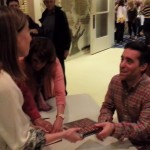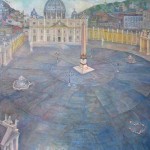Books are where things are explained to you; life is where things aren’t. I’m not surprised some people prefer books. Books make sense of life. The only problem is that the lives they make sense of are other people’s lives, never your own.–Geoffrey Braithwaite, narrator of Flaubert’s Parrot
Julian Barnes, author of the 2011 Man Booker Prize winning The Sense of an Ending, is interested (perhaps compulsively) in the role fiction plays in our lives. Most recently, he published a series of essays entitled Through the Window in which he writes: “Novels tell us the most truth about life: what it is, how we live it, what it might be for, how we enjoy and value it, and how we lose it.”
In Flaubert’s Parrot (a much earlier work published in 1984), Barnes’  teases out this question of why fiction matters. The main character, Geoffrey Braithwaite, seeks to understand the circumstances of his own life through his curiosity about the life and work of Gustave Flaubert. Although Braithwaite ridicules literary critics and asks, “Why does the writing make us chase the writer? Why aren’t the books enough?”, he too become obsessed with the life of the writer. He alternates between wanting to know the truth about Flaubert, his lovers, his family, and his parrots with the bigger question as to why any of this even matters. After all, shouldn’t the fiction stand on its own?
Perhaps Braithwaite only gets it half right. Novels do help us to make sense of other people’s lives, but in the end they often offer a way for us to understand our relationships as well as the world around us. Unlike authors, we can’t control outcomes or predict what will come next. However, many of us do make wonderful discoveries through our reading, and this is one reason why we love talking about books with each other.
There is also laugh-out-loud humor in Flaubert’s Parrot. Braithwaite proposes a set of rules for all future authors which includes: ‘no more novels about incest,’ ‘no scenes in which carnal connection takes place between a human being and an animal’ and ‘no more novels in the which the narrator is identified by an initial letter.’ However, he also writes, “There shall be no more novels which are really about other novels.” This is pretty ironic since Braithwaite’s story (and Barnes’ novel) is essentially about Madame Bovary!
Collectively, we enjoyed Flaubert’s Parrot. It offers, using an innovative structure and style, a way to look at how art mirrors life and the importance books play in understanding the human condition. For this alone, we think it’s worthwhile. Let us know what you think by posting a comment at the top of the page.



